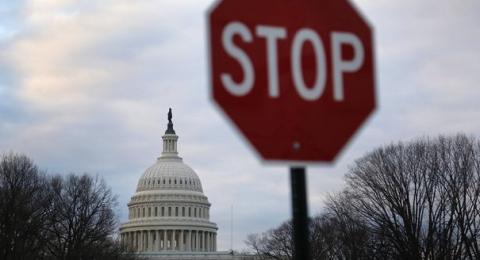"A majority of the American public believe that the U.S. government engages in widespread monitoring of its own citizens and worry that the U.S. government could be invading their own privacy," says Monmouth University reporting the results of a recent survey it conducted of 803 U.S. adults earlier this month.
Well we should hope so! The U.S. government does engage in widespread monitoring of its own citizens.
This was actually known to the public even before Edward Snowden blew the whistle on several unconstitutional NSA surveillance programs in 2013, with the help of Glenn Greenwald.
But after Snowden– a high level intelligence worker, first for the CIA, then the NSA– revealed the extent and sophistication of NSA programs to canvass the American public's data, a revelation that earned months of mainstream media coverage, even the casual observer cannot doubt that the U.S. government spies on its own citizens in violation of its own charter, the U.S. Constitution, which says in Amendment 4 to the Bill of Rights:
"The right of the people to be secure in their persons, houses, papers, and effects, against unreasonable searches and seizures, shall not be violated, and no Warrants shall issue, but upon probable cause, supported by Oath or affirmation, and particularly describing the place to be searched, and the persons or things to be seized."
Repeat after me:

Well as it turns out some Americans happen not to like nameless, faceless, unelected federal police bureaucrats in a dozen alphabet soup agencies illegally spying on the government's own citizens in violation of its own promise not to spy on U.S. citizens without due process– you know: having a reason good enough to take to a judge and get a warrant specifically describing what the police are up to and why someone is being searched.
And furthermore it turns out that independent voters are the ones that like that the least out of anybody. Monmouth reports:
"Just over half of the public is either very worried (23%) or somewhat worried (30%) about the U.S. government monitoring their activities and invading their privacy. There are no significant partisan differences – 57% of independents, 51% of Republicans, and 50% of Democrats are at least somewhat worried the federal government is monitoring their activities. Another 24% of the American public are not too worried and 22% are not at all worried."
Monmouth says it's not significant, but independent voters are twice their highest margin of error (+/- 3.5%) more likely than Democrats to be concerned about Deep State canvass monitoring of American civilians, and lead Republicans by pretty much the same amount.
Independents are also far more likely than Republicans to say all this monitoring is either rarely or never justified:
"Few Americans (18%) say government monitoring or spying on U.S. citizens is usually justified, with most (53%) saying it is only sometimes justified. Another 28% say this activity is rarely or never justified. Democrats (30%) and independents (31%) are somewhat more likely than Republicans (21%) to say government monitoring of U.S. citizens is rarely or never justified."
Patrick Murray, director of the independent Monmouth University Polling Institute, says:
"We usually expect opinions on the operation of government to shift depending on which party is in charge. But there’s an ominous feeling by Democrats and Republicans alike that a ‘Deep State’ of unelected operatives are pulling the levers of power."
And independent voters are at the forefront of this increasingly bipartisan suspicion and concern over the activities of the vast unelected 21st century federal surveillance state.
Politicians who are elected should take notice.
